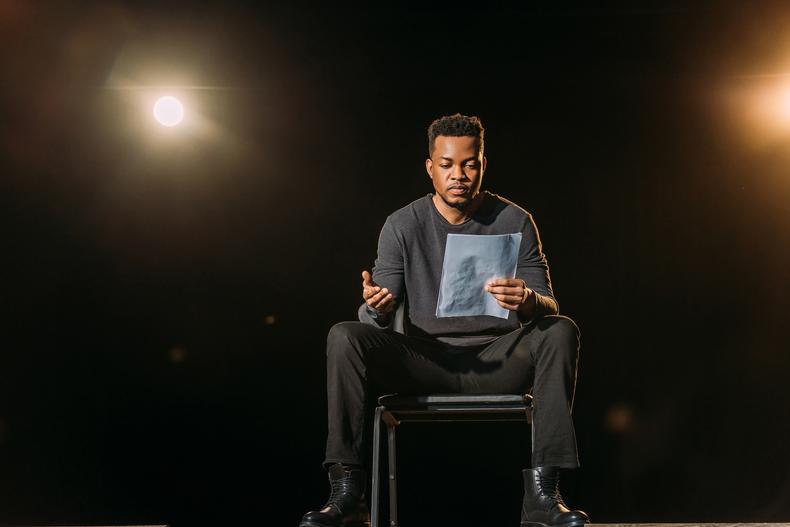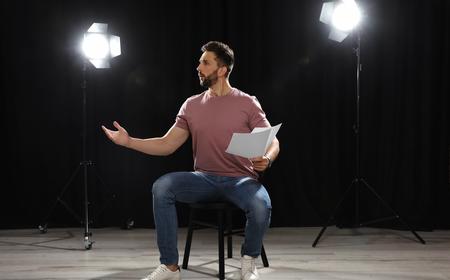
What’s the best way to memorize lines quickly? Perhaps you have 12 pages of sides for a callback tomorrow morning, or you have to memorize a two-hour play in a week because someone just dropped out. Whatever the reason, you have no idea how you are going to learn the lines so quickly.
“Here’s a secret: Memorization is not about remembering the words,” says acting coach Joseph Pearlman. “The way you memorize the script can directly impact your performance. A good process of memorization allows you to absorb the words so that you don’t hesitate or have to think about what comes next—similar to how you don’t have to think when you’re reciting the alphabet. You know what letter comes after L. You don’t even need a split second to check with your brain cells on that one.”
While every coach and performer has their favorite tweaks to these methodologies, here are some tried-and-true methods that experts agree on about how to memorize lines.
JUMP TO

LightField Studios/Shutterstock
“The first time you run through, just listen to the words. Focus on pausing between each line, really absorbing what’s being said and going over the scene many times in many different ways, playing with intention, actions, and pacing. Try it sitting and standing. Allow yourself to make mistakes and explore every way not to do it while getting comfortable with the lines. Focus on the “why” and the circumstances to learn the scene on a deeper level. If you forget your lines, you can find your way back because you really understand what’s going on.” – acting coach Matt Newton
“Find a quiet place. Read all dialogue out loud—your lines and your partner’s, too. You do not want to act out or emotionalize the text as you’re reading it. Read the lines in neutral, seeing what you’re saying as you’re saying it. Read your individual sides or the entire script all the way through. Those of you who have been fortunate enough to enjoy an extended run of a play know that by the 10th, 20th, or 60th performance, realizations emerge within the text, enriching your performance. The same is true here.” – Pearlman
“Whenever [Bradley Whitford and I] would run lines, we would always run it three times. Doing it in threes always helps. If you’re running lines with your scene partner or about to do a scene, doing it three times sort of cements something in your mind.” – Emmy winning actor Sarah Paulson
“It takes me three runs. I have to read it the night before, then during hair and makeup; then, I have to say it alone in a quiet space. And then for the rehearsal, I have to hold [the sides] in my hand.” – Oscar winning actor Reese Witherspoon
“Repetition, repetition, repetition. Always the way! The more you say it, the more you’ll know it.” – founder of 3-2-1- Acting Studios Mae Ross
“Repeat, repeat, repeat. This is the best way to condition your brain quickly. Highlight the character’s lines. This will allow you to quickly locate the appropriate line when glancing down at the paper. Break the lines down into smaller pieces. Don’t tackle the entire script all at once. Break the script down into small sections and repeat, repeat, repeat until the lines are ingrained. Work on lines before going to sleep. Studies have shown that studying lines right before bed can have a big impact on recall. Be sure to review them again in the morning to help lock them into memory.” – acting coach Denise Simon
“When you're finished reading the piece out loud, draw a small line somewhere on your script to delineate that you have read the entire piece all the way through once. Read the piece out loud in the same way once more. After you have done so, draw a line to cross the original line that you drew. It will look like a plus sign. This signifies that you have read the entire piece out loud, with full awareness, two times. Read it aloud a third and fourth time making horizontal bisecting lines to mark those reads. After the fifth reading, draw a circle around the bisecting lines to create your first pinwheel (see diagram to the left).
“The goal is to get as many pinwheels as possible every day until the piece is memorized cold. Like the stars on one of Van Gogh’s canvases, these pinwheels assist by giving you a visual sign of the work you’re doing and the steady progress you’re making. Memorization is not a boring step you need in order to get to the real craft of acting. Memorizing properly is a crucial component of the craft; your words will automatically start to shape and create your reality when you adopt them as your own.” – Pearlman

Ground Picture/Shutterstock
Here is our full list of line memorization apps that actors should know about. Both Ross and Newton recommend Rehearsal Pro.
“Users can upload their scripts to the phone app straight from their email inboxes, highlight their lines, record their scene partner’s lines, and memorize! Super useful and efficient. The app also has functionality to record voiceover auditions that you can send directly to your agent or manager.” – Ross
“This is hands down my favorite way to learn lines. It’s the scene partner that never gets tired of running lines with you. If you can get past the fact that it’s $19.99, this is a game-changer. You can highlight your lines in the app, record the other character’s lines, and use it as a teleprompter. Then it just keeps playing on a loop.
The secret for me is to whisper my lines and read the other character’s out loud when recording so I don’t get too caught up in the way I’m saying my lines, but I know how much time I have to say them. I will literally put my iPad on a chair and pretend I’m running lines with someone. It’s so much better than a tape recorder. Love it.” – Newton
“1. Check out the myths about memory here and give yourself a fighting chance by dispelling them immediately.
2. Accept that your memory is already much better than you think, because I promise you, it is.
3. Realize that scripts are merely a string of sentences and that each sentence is just a grouping of images, ultimately used to convey story and meaning. If you can picture an image for each key word or phrase, then you can connect those images as you might link in a chain.” – acting teacher and founder of Acting 4 Camera Paul Barry
“The oldest trick in the book: Hand-write your lines on a piece of paper. And then do it again, and again. And be sure to write out not only your lines, but all of the characters’ lines. This sounds tedious, yes, but it works!” – Ross
“I write my lines out. Sometimes the actual act of writing them down makes you remember them more easily.” – Paulson
“This is quicker than you think and you always remember the lines word for word when you’re done. I’ve used this for memorizing longer scenes with lots of speeches and find it works really well because you’re connecting your mind to the action of writing the lines down and seeing them at the same time. (I prefer writing them by hand instead of typing.)
Write out just your lines in one big paragraph, then run through the scene out loud. Do this five more times, breaking your lines into thoughts each time. The last time you write them out, see if you can do it without looking at the script and just think of the other person’s lines.” - Newton
“Visualize what you’re talking about, rather than focusing strictly on how to say it. If you have very little imagery in the text you’re attempting to commit to memory, flex your imagination. Imagine what the language in the text reminds you of, then picture each thought using as many of your senses as possible to recall each thought (each line). In other words, picture what you’re talking about with as much sound, movement, and imagery as possible.” – casting director Kate McClanaghan
“From the very first time you see the scene, read it like a good novel and imagine yourself in the scene as if it were real. This will already start making the reality and flow of the scene make sense to you. Make sure you understand what is making you say your words and what causes you to transition from one beat to the next.” – founder of Hartt and Soul Studio, Cathryn Hartt
“Try memorizing images instead of lines. It’s a technique I use whenever I’m directing actors to play Shakespeare or any material that employs imagery or descriptive language, but it works with all material as long as the actor has an imagination. I’ve seen actors use it to memorize entire acts of a play in a weekend. Simply associate a specific image or visual with each of your lines and your lines will come to you much faster. It’s because the mind remembers images faster and better than it does words. Obviously, it helps if the material is of a certain nature, but you can take even the most ordinary, boring dialogue and associate images with it as long as you have an imagination.” – author, director, and publisher of CleverActorTips, John Swanbeck
“First, figure out what you want in the scene. Then identify the events that move you toward or set you back from getting it. New events require you to adjust your thinking in order to continue getting what you want. Think of each adjustment as a new section in your train of thought.
Having a train of thought that makes sense to you rather than thinking about dozens of individual lines to memorize is more manageable and makes memorization much easier. Understand your train of thought and the individual lines will come faster.” – audition coach Philip Hernández

New Africa/Shutterstock
“Get a partner to repeat your lines back and forth with you, over and over again. Start with each individual line, then expand to several lines at a time, so you hear them aloud from someone else. The continuous hearing of these lines in different tones and inflections will keep you from being locked into one way of memorizing them. The same lines, your lines, back and forth. Each moment will bring a slightly different read.
Actively listen to your partner. Once you have the memorization down, have someone do the scene with you. Focus on actively absorbing your partner's lines before you say yours. No two moments are alike, and if you listen and absorb honestly, you'll get in the habit of responding honestly each time. Acting isn't about the words—if it were, we'd hire readers.” – acting coach Todd Etelson
“Having another actor to rehearse with, if possible, is always the ideal way to prepare for auditions. Even having a family member with no formal acting training to read lines with you will help. You don’t need an Oscar-winning performance from your scene partner. In fact, having a rehearsal partner read the lines in a monotone voice can be helpful preparation (we all know that audition readers aren’t always trained actors). So invite a friend over, get on your feet, get that script in your hand, and rehearse!” – Ross
“Sometimes you can be living-room-ready, you know? Like you know all your lines in your living room, then you get on set, and go, ‘Oh my God I don’t know any of them.’ You’re not used to someone speaking back to you…. I think by yourself, you can only do so much. The minute you walk into the [audition] room and someone’s there looking at you and reading opposite you...everything goes out the window!” – Paulson
“I have my headphones on and I’m mouthing. In New York no one cares if you look like a psycho. I’m just walking around mouthing all my words, I don’t care.
“What you want to do is marry movement with your dialogue. Nobody just sort of sits with their lines. Often you’re walking and talking and moving, depending on the play or TV show. You’re liable to be messing with a prop. If you only know your lines when you’re seated and concentrated on your lines, then the minute a prop master throws you a piece of paper you’ve got to hand off to someone—or a briefcase or purse or coat—all of a sudden your lines go out the door.” – Paulson
“With a partner or on your own, take a tennis ball or even a piece of fruit and throw it back and forth with your partner (or up and down if you’re working alone) while keeping the ball in control. So you don’t get stuck in a rhythm, start to move around the room in a random pattern. When you get into a good throwing groove, rapidly speak the text in neutral so you’re not “acting” it. If at any point your hand starts to hold onto the ball (unable to toss it to your partner), mark your script accordingly because those lines are not cold.
“I like this exercise because it helps to create a pressurized environment that can at times mimic the pressure inherent in the audition room.” – Pearlman
Looking for remote work? Backstage has got you covered! Click here for auditions you can do from home!
The views expressed in this article are solely that of the individual(s) providing them,
and do not necessarily reflect the opinions of Backstage or its staff.
 How Reading Out Loud Can Benefit Actors
How Reading Out Loud Can Benefit Actors 














